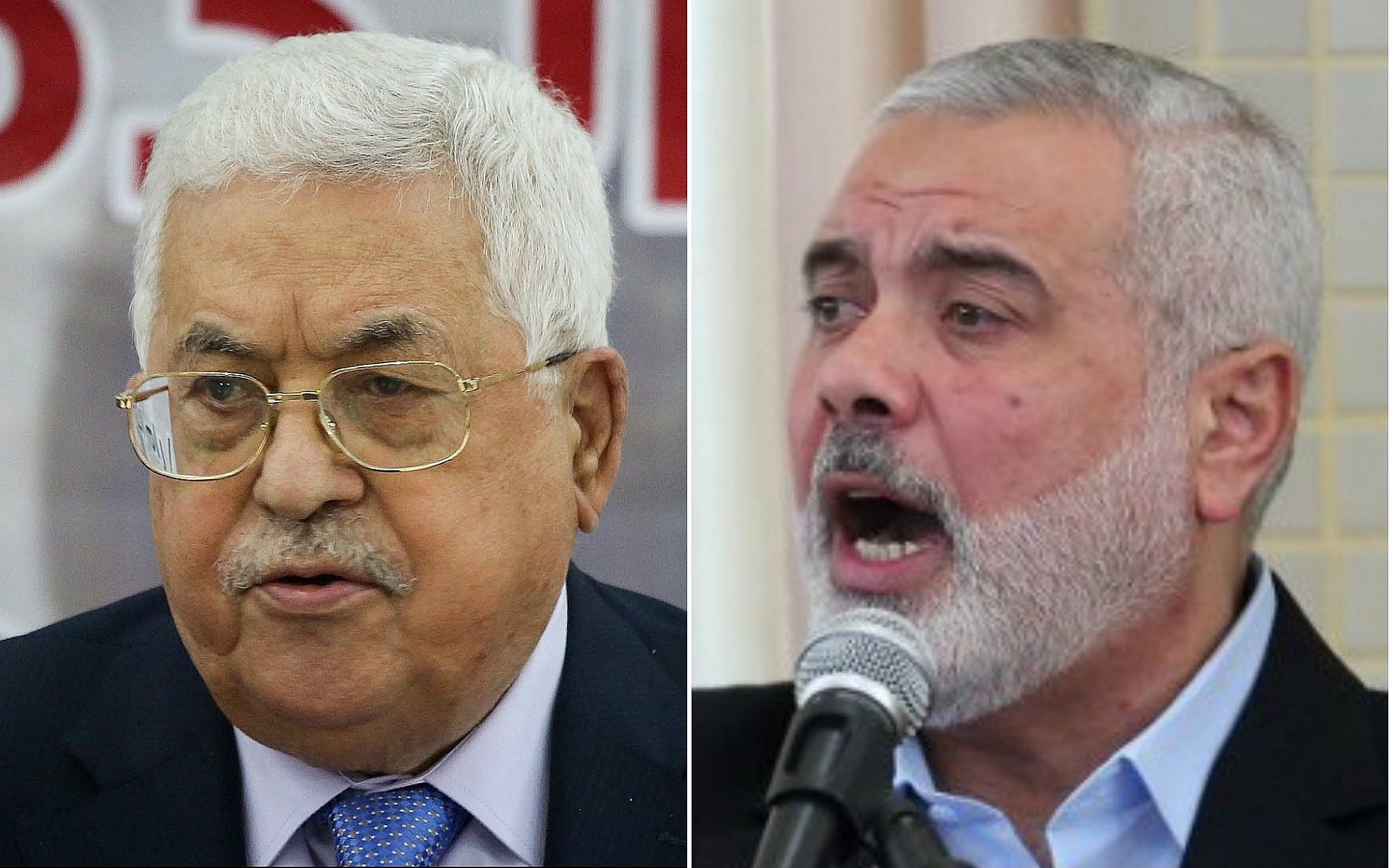The rival Palestinian movements Fatah and Hamas are set to meet in in Istanbul, Turkey for the first direct talks since 2017, aimed at ending the 15-year-long rift in Palestinian politics, Fatah said Monday.
Palestinian Authority President Mahmoud Abbas’ Fatah faction is to be represented by a delegation led by Fatah Secretary General Jibril Rajoub and Central Committee member Rawhi Fattouh.
The delegation arrived in Istanbul on Monday night to begin talks with representatives of Hamas, Fatah said in a statement on its Twitter page.
The statement said talks would focus on “ending the division and applying the directives of the conference of Palestinian faction heads,” referring to a recent joint meeting of senior Palestinian officials who convened in response to the United Arab Emirates’ decision to normalize ties with Israel.
Palestinians across the political spectrum opposed the step, which they called a betrayal of the Arab states’ pledge not to establish open ties with the Jewish state before the establishment of a Palestinian state.
The meeting included Abbas and his rival, Hamas terror group chief Ismail Haniyeh.
“Abbas has given a green light,” Rajoub told Palestine TV on Monday.
Fatah and Hamas have been at odds since a bloody Palestinian civil war in 2007 over the Gaza Strip ended with Hamas expelling Fatah to the West Bank. Since then, the Palestinian national movement has split into two regimes: the Fatah-dominated Palestinian Authority that rules the West Bank, and the Hamas terror group that controls the Gaza Strip.
Hamas has yet to publicly comment on the talks, although Hamas-linked media carried the Fatah statement. According to Fatah, the Hamas delegation includes both Haniyeh and deputy chief Saleh al-Arouri.
Azzam al-Ahmed, the Fatah Central Committee member responsible for the reconciliation portfolio, was not mentioned.

Palestinian Authority President Mahmoud Abbas (left) and Hamas leader Ismail Haniyeh (Flash90, Said Khatib/AFP)
The Istanbul meetings would be the first meetings since 2017 reconciliation talks in Cairo; the agreement reached in the Egyptian capital failed to bridge the divides between the two groups.
Abbas also spoke with Turkish President Recep Tayyib Erdogan on Monday night to “update him on the talks taking place between Hamas and Fatah” and thank him for his “support” for the Palestinian cause, according to a statement carried by the official Palestinian Authority WAFA news outlet.
Numerous attempts to unite the two rival factions have ended in failure. They have been held in a constellation of different Arab capitals — Riyadh, Doha, Sanaa, Cairo. But the two movements were and are deeply divided, both by ideology and by a mistrust rooted in a history of violence. Recent talks have repeatedly floundered over Hamas’s refusal to give up its arms and separate military force.
The Palestinian public, who have seen numerous unity talks come and go, remains deeply skeptical of the potential for reconciliation.
Palestinian officials have attempted to convince them otherwise all summer, beginning with the campaign against Israel’s plan to annex parts of the West Bank. Rajoub and al-Arouri held a joint press conference in Ramallah — with the Hamas deputy beaming in virtually from Beirut — where the two vowed that their movements would coordinate “popular resistance” against annexation.

Senior Fatah official Jibril Rajoub, in the West Bank city of Ramallah, attends by video conference a meeting with deputy Hamas chief Saleh Arouri (on screen from Beirut) discussing Israel’s plan to annex parts of the West Bank, on July 2, 2020. (Abbas Momani/AFP)
But a proposed joint rally in Gaza where Abbas would speak never materialized. And only a few hours after Rajoub and al-Arouri called one another “brothers,” PA security forces dispersed a West Bank rally where Hamas flags were raised.
As the annexation deadline came and went without any tangible changes, the unity calls slowly faded into the background.
Until, that is, the sudden trilateral announcement by the United States, Israel and the United Arab Emirates that the UAE and Israel were establishing open ties. Abbas called a meeting of Palestinian Secretaries-General — senior officials from fourteen factions attended, including from — Hamas and Palestinian Islamic Jihad.
In a joint statement following the meeting, the faction heads said they would establish a joint committee to propose reforms to the Palestinian Liberation Organization and lead the way towards long-delayed elections. Abbas pledged to follow the committee’s recommendations.
Such promises have come and gone before, however. “Green light” or not, most Palestinians are not holding their breath for the two parties to bury the hatchet.
In a recent poll by the Palestinian Center for Policy and Survey Research, only 11% of Palestinians surveyed believed that the two factions would unite in the short term.
Related posts:
Views: 0
 RSS Feed
RSS Feed

















 September 22nd, 2020
September 22nd, 2020  Awake Goy
Awake Goy  Posted in
Posted in  Tags:
Tags: 
















